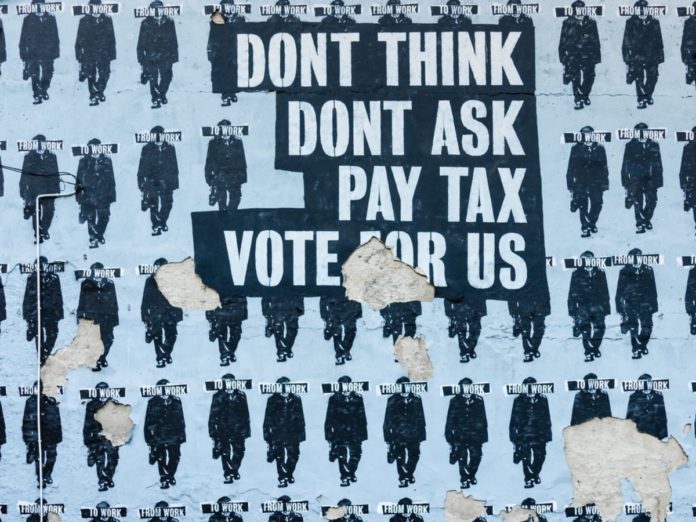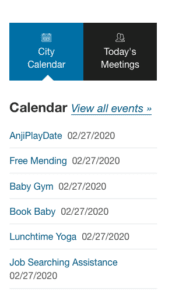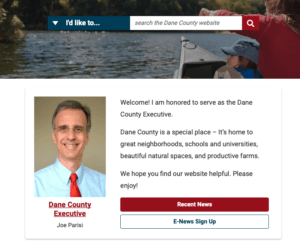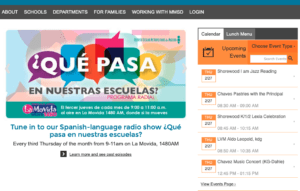This week the City of Madison agendas are a mess, the county only posts some agendas on-line, School Board meets in closed session more often than open and doesn’t have minutes for months, and the School Board, City and County have been posting meeting a day or two before the meeting.
BACKGROUND
The City is talking about creating an Office of Resident Engagement and had a 2 year discussion on the structure of city government. The County has Engage Dane that was cooked up behind closed doors and in likely illegal meetings. The School Board doesn’t even try to pretend they want to hear from the public and are getting criticized about their most recent superintendent hiring process, and is in violation of state law by not having their minutes available within 45 days. Our local governments and the elected officials have a serious transparency and communications problem.
I hear the elected officials saying they don’t understand why the public isn’t more involved and often blame the public for not caring or giving input too late. They have meetings out in the community but don’t promote them and hire consultants to get public feedback from small handpicked groups of people, with mixed results. But really what is happening is they are ignoring the basics!
RECOMMENDATIONS
If elected officials want public input, and I’m not convinced they all do, let’s start with the basics.
- Clearly communicate the problem you are trying to solve and what you want public feedback about or what the public has the opportunity to give feedback on, even if you don’t actually want the feedback. Make the information easily accessible and give people more than a few days to provide input or attend a meeting.
- Clearly articulate how you want that feedback. Make it easy for people to provide meaningful feedback
- Actually listen and engage when you get the feedback.
To me, this translates to the following simple things that can be changed.
Clearly communicate the problem you are trying to solve and what you want public feedback about or what the public has the opportunity to give feedback on, even if you don’t actually want the feedback. Make the information easily accessible and give people more than a few days to provide input or attend a meeting.
This is step one. The very, very, very basics. People need to know when public officials are meeting and what they are meeting about in a timely manner.
- Routine meetings
- If a meeting is on Monday, don’t wait til Friday to post the agenda. Meeting agendas (and their materials) should be posted at least a week in advance. Most people aren’t going to plan to attend a meeting if there is nothing on the agenda of interest to them. And to find out on late Friday afternoon that you need to be at a meeting at 3:30 on Monday (ex. Alliant Energy Center) is pretty near impossible for most people.
- Include the attachments to the agendas prior to the meeting or provide handouts for the public instead of just the committee members.
- County: I shouldn’t have to request copies of handouts from meetings after the meeting. When I read in the minutes that the calendar for redistricting was discussed, it should be attached to the agenda.
- City and County: I shouldn’t have to stand up and walk to the front of the room, sometimes interrupting the meeting, and ask for a hand out that was given to all the committee members when there is a pile of extras sitting on the table next to a staffer instead within public reach. They should be handed to the members of the public or put by the registration sheets.
- City: Some committees are notorious for not including attachments in legistar and the only way to get them is to attend the meeting (Community Services!)
- City, County, School Board: Have clear alert systems so when attachments are added to an agenda item you are following (first it has to be a legistar linked item) you will be alerted something has been added.
- Madison Schools: Sometimes agendas have the same items under reports from committees and elsewhere on the agenda, however the attachments in the different agenda items are different.
- Fix the agenda titles in legistar and boarddocs. Make them plain language without the use of acronyms. Long legal descriptions in the title are often meaningless.
- City: If the project is about the public market or Judge Doyle Square, say it in the title. Don’t make people have to figure out what property is being discussed by an address, use the common names.
- County: DROP THE ACRONYMS. There are times I can’t figure out what is being discussed and I’m fairly well informed and read tons of agendas and click on legistar links (if there are any) and still I’m baffled about once a week. The worst are the EMS related committees and the Health and Human Needs or Personnel and Finance Committee meetings that have agenda items such as:
2019 HSCA-013 84472_addendum Waisman (CSU) or 2019 FTR-46 200218 – 15 FAMILY CARE_IRIS REVENUE or 2019 FTR-43 200123 – 06 S85.21 TRANSPORTATION GRANT or Chapter 20.08 Exception Request – Clerk of Courts – All real agenda items on agendas this week.
- Make sure “reports” are really reports and not agenda items that people take action on.
- City and County: I know people hide all kinds of things in “reports”. If you know in advance what the items are that will be reported on – that should be on the agenda so the public knows if it wants to hear the “reports”.
- City and County: Some “reports” have actual action items in them. If there is going to be action on “report” that item definitely should be separately listed on the agenda or the action should be postponed until the next meeting when it can be properly noticed.
- Madison Schools: Don’t hide resolutions “passed” by the School Board in a “report”
- Create meaningful minutes.
- City: The city attorney’s office has instructed city staff who staff committees to only include motions and votes. So none of the substance of the discussion is now included, making the minutes meaningless to read.
- County: The county is equally bad, so often I open an agenda item and the minutes read “the committee discussed (insert name of agenda item)” and that is all you can read.
- Schools: Well, they need to have their minutes ready sooner than 6 months after the meeting and post them where people can find them. If an item appears several meetings in a row and you can’t see what recently happened you can’t catch up with where things are at.
- Have all the meetings listed in one place.
- City: You shouldn’t have to look at the City Clerk’s Agenda and Legistar and piece together your own list of meetings like I do every week.
- County: You shouldn’t have to go to the clerk’s bulletin board to find out what other meetings are taking place that are not in legistar.
- Schools Board: Just stop having illegal meetings that are not noticed but school board members clearly make a decision outside of publicly noticed meetings.
- When meetings are added throughout the week, make it obvious.
- City: At the city you can sign up for alerts that are sent to your email box. Sometimes you’re sent something in error, or I can’t figure out why it’s being sent, but at least you get notices that make sense.
- County: I often get emails saying that something has changed but I can’t figure them out and usually can’t tell what has changed.
- Schools: They’ve been adding a lot of meetings later in the week with amended legal notices, but there’s no alert system at all, unlike the city and county.
- Don’t make people sign up to get notifications from each committee individually or visit multiple websites.
- Have the agendas prominently on the front page of the websites.
- City: They came close, if you click “today’s meetings you will see them”, if you don’t, you get a pretty strange list of items that don’t seem government related.
-
-
- County: Don’t get me started . . . I’m not sure what their redesign is supposed to be accomplishing but you have to know where to click and click several times to get to the weekly agendas. It looks like a campaign site for Parisi.
-
-
-
- Madison Schools: The worst of the three. I can never remember how I get anywhere on this page. And of course, you have to look under “departments’ to find the school board?!?
-
- Special meetings
- Give notice in terms of weeks, not days. Madison Metro is giving weeks to provide information on the bus route changes. School board gave just a few days notice to show up three nights in a row to see the superintendent candidates. Who can do that?
- Provide childcare
- Provide parking reimbursements.
- Video and Audio recordings
- Particularly if the minutes are going to be minimal, there needs to be a way for the public to find out what people discussed regarding an item. This is particularly important for meetings held during the day or on nights were there are multiple meetings going on at the same time. This is not only important for the public, but the elected officials as well.
- Audio recordings are simple and even if bad quality are better than nothing. Of course, there are a few rooms in the city where the HVAC system is so loud it sounds like you’re in an airplane. That should be fixed.
- There is a place in legistar next to the minutes where audio recordings could be attached.
Clearly articulate how you want that feedback. Make it easy for people to provide meaningful feedback.
This is step two. If you don’t know what is being discussed or get enough time to review information, form an opinion you’re not going to get to the point where you would give feedback. Unfortunately, people often don’t even get to the this step because step one is so bungled.
On-line Feedback
- Go beyond Polco – simply asking one question in a creepy format that gathers and reports information on you is not getting feedback.
- Have the committee members emails available to the public if that’s the only feedback outside of going to a meeting. The city is fairly good, the county has lots of missing information. The school board has no format to do this.
- Ideally when you click on an agenda, you should be able to click somewhere to provide feedback.
Honestly, there’s more here, but until they do step one, what’s the point. You can’t give feedback on something you don’t know about.
Actually listen and engage when you get the feedback.
- If someone sends and email to the general emails that go to all alders, supervisors or school board members, make sure at least one person responds or set an auto-responder with information about what people should expect.
- Make your email response meaningful. The trite carefully crafted political campaign messages that don’t make a commitment on an issue one way or the other are maddening.
These things don’t cost any additional money and are things current staff can do now, with the exception of child care and parking reimbursements and video recording. These are things that would go a long way towards improving the public’s ability and willingness to participate in their local governments.
I kinda stopped after step one because step one is so critical to getting meaningful feedback. I know I missed some ideas, feel free to add your own pet peeve in the comments below.











